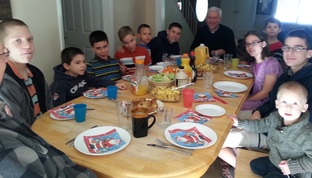 Breakfast with the Arias family and some of their twelve beautiful children. Large families make a priest’s heart sing!
Breakfast with the Arias family and some of their twelve beautiful children. Large families make a priest’s heart sing! On the Sunday after Christmas, the Church directs her thoughts to the Family, indeed, the “Holy Family.” With the Bethlehem shepherds, we kneel to gaze upon that most basic, God-given community—the family of Jesus, Mary, and Joseph. This year I found it very hard to find Christmas cards with Jesus, Mary, and Joseph on them. Snowmen, reindeer, ice-skating Snoopies and penguins with Santa Hats—all sorts of imaginary images but not one of Jesus and his family. Try this: google “Christmas” and click the images tab. How many silly images of Santa Clauses and chorus girls in red tights will you go through before you get an image of Jesus and Mary? But a culture embarrassed about Jesus at Christmas is like a teenager embarrassed to be seen with his mother in public. We love her, and depend on her, but can’t possibly be seen with her.
Hannah’s Offering
The first reading for today’s feast is the lovely story of Hannah in the temple, from First Samuel. The beautiful Hannah had been married to Elkanah for many years but God had not given them a child. In the Jewish culture especially, to be childless was a woman’s greatest shame and sorrow. Hannah had made a sort of deal with Yahweh: “if you give me a child, I will dedicate him to your service.” You can imagine a devout Catholic woman promising God her firstborn son she for the priesthood. Well, Hannah has a baby boy and brings him to the temple: “I prayed for this child,” she tells the temple priest Eli, “and the Lord granted my request. Now I, in turn, give him to the Lord.” With those words, she turns and leaves the temple. Can you feel the pathos as she leaves her child behind? God graciously accepted her offer, and the child Samuel grows up to become one of Israel’s greatest prophets.
The Finding in the Temple
Hannah leaves her only child in the temple and walks away. Another mother will leave her only child in the temple and walk away—we hear of this in the Gospel today, and every time we pray the fifth mystery of the rosary. The Blessed Mother of Jesus leaves her only son in the temple, or rather, he deliberately separates himself from her. Men and women at the time traveled in separate caravans, and boys could travel with either one. We can understand how Joseph thought Jesus was with the women, and Mary thought he was with the men. An entire day lapses before they learn that Jesus was not with either one. Beyond the horror of losing their only child, they had lost the promised Messiah and failed their entire nation. They rush back to Jerusalem and spend three days searching for the lost child. Mary is understandably upset: Son, why have you done this to us? Do you not know that your father and I have been looking for you for three days? But the boy’s reply is mysterious: “Why were you looking for me? Did you not know I must be in my Father’s house?” He seems to disrespect both parents (“I am not subject to anyone but my Father, and Joseph is not my father”). But isn’t that how God works with us at times, leading us through confusion to a greater faith?
The Lord Jesus, even at age 12, leads his own mother into a greater faith. She who is given a child must give that child back to God, as Hannah did, and keep silence before God’s mysteries. She said not another word, and learned that her child is not her own. Everything we have—the home we live in, the car we drive, the body we use—is from God and going back to God. It is our role to send it all back to Him. Dedicating a son for God’s purposes is a woman’s deepest desire, and why so many mothers cry to me that their children are no longer attending Mass. Above all we want our children’s greatest good, which is to know, love and serve God, but God demands that service in a manner and time of His own choosing. It is sometimes very hard to give when He asks, and we sense we have lost our chance if we don’t give our children when and how He demands. But God always gives us another chance to entrust ourselves, and our children, to Him.
Still our best hope to reach God
The family is still our best hope of doing that. Simply by having children, we honor God. We honor Him more perfectly by educating these children to know, love, and serve Him in this life, and to be happy with Him in the next. And in honoring God, we honor the entire human family. “How vast and rich,” writes St. John Paul, “is the treasure of Christian truth about the family! It is a necessary good for peoples, an indispensable foundation for society… it is a unique good for children… a school which enables men and women to grow to the full measure of their humanity.” How vast and rich this mystery, before which we kneel today. Let us ask Our Lady to help us honor God in our marriages, in our children, in our families.


 RSS Feed
RSS Feed